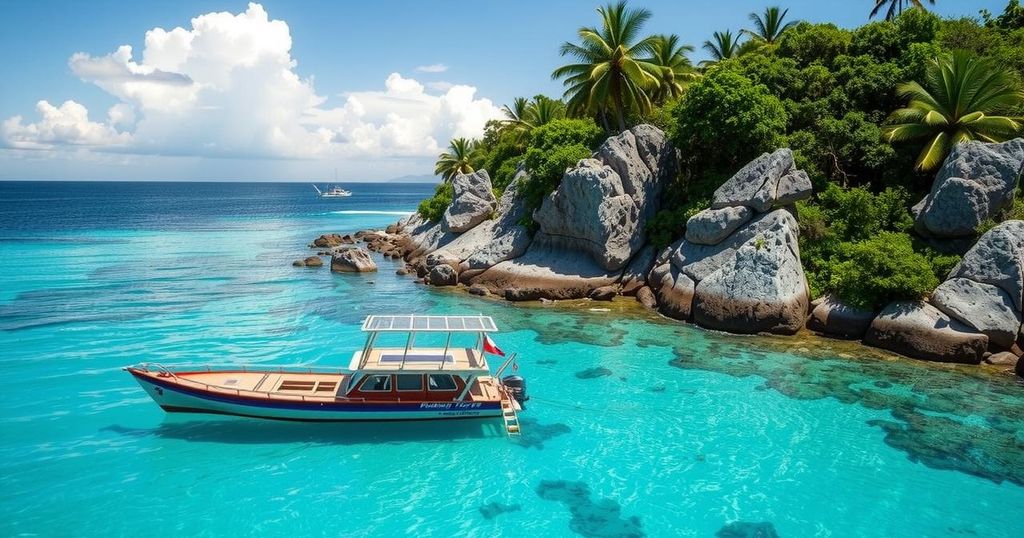Seychelles Advances Blue Economy Initiatives with Maritime Training

Seychelles is promoting its Blue Economy by offering significant training on maritime boundary delimitation and marine biodiversity conservation. Minister Jean-Francois Ferrari emphasized the importance of building local expertise in ocean governance, highlighting recent workshops that certified participants in these key areas. Seychelles leads in establishing its maritime boundaries and has ratified the global BBNJ Agreement, enhancing its role in international marine conservation.
Seychelles is reinforcing its leadership in ocean governance through advanced training focused on maritime boundary delimitation and marine biodiversity conservation. Minister for Fisheries and Blue Economy, Jean-Francois Ferrari, emphasized the necessity of capacity building within the Blue Economy framework, particularly for Seychelles, a small island developing state boasting a vast Exclusive Economic Zone of 1.4 million square kilometers.
Ferrari remarked, “Ocean governance is central to the country’s economy, environment, and national identity, which is why investment in capacity building in the various areas of the Blue Economy is essential.” He noted that such workshops provide not only technical skills but also foster a community of professionals dedicated to sustainable marine management.
Recently, the Department of Blue Economy hosted two pivotal workshops: the Biodiversity Beyond National Jurisdiction (BBNJ) workshop, and the Maritime Boundary Delimitation seminar, which resulted in the certification of 38 participants. These training sessions aimed to enhance national expertise crucial for effective marine governance in Seychelles.
With 90 percent of its maritime boundaries already defined, Seychelles is actively engaged in negotiations regarding the remaining boundaries adjacent to Madagascar. Chrissant Barbe, Director General for the Department of Blue Economy, stressed the diplomatic significance of the unmarked area, noting that trained workshop participants will aid in these essential discussions.
Seychelles has previously established maritime boundaries with several nations, including France, Tanzania, Mauritius, and Comoros, making it imperative to understand maritime delimitation principles for effective resource management.
Furthermore, Seychelles has taken a significant step in global marine conservation by being the fourth country worldwide and the first in Africa to ratify the BBNJ Agreement, which underscores sustainable use and protection of marine biodiversity in areas beyond national jurisdiction. This workshop educated over 20 key stakeholders on the treaty’s implications, reinforcing Seychelles’ pivotal role in international marine governance.
The Blue Economy framework focuses on sustainable management of oceanic resources, significantly impacting sectors such as fisheries, tourism, and renewable energy in Seychelles. The ongoing commitment to enhancing expertise in both maritime boundary delimitation and marine biodiversity conservation illustrates Seychelles’ ambition to protect and sustainably utilize its ocean resources for future generations.
The Blue Economy represents a sustainable approach to managing ocean resources, seeking to harmonize economic growth with environmental protection. In island nations like Seychelles, where marine resources are vital, this model supports essential sectors including fisheries and tourism. As a small island developing state possessing one of the world’s largest Exclusive Economic Zones, Seychelles is uniquely positioned to lead initiatives that promote the sustainable use and governance of its extensive marine territories.
In summation, Seychelles is diligently advancing its Blue Economy agenda through critical training initiatives aimed at enhancing maritime boundary delimitation and marine biodiversity conservation. The government’s commitment to capacity building ensures that the nation remains at the forefront of ocean governance, fostering sustainable management of marine resources while bolstering its international role in marine conservation. This strategic approach will safeguard the ecological integrity and economic viability of Seychelles’ ocean spaces for future generations.
Original Source: www.seychellesnewsagency.com




